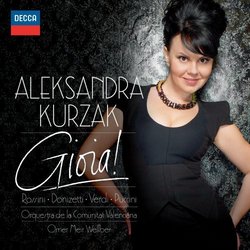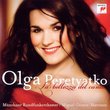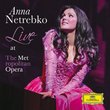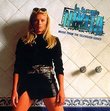| All Artists: Aleksandra Kurzak Title: Gioia Members Wishing: 0 Total Copies: 0 Label: Decca Records Original Release Date: 1/1/2011 Re-Release Date: 9/13/2011 Genre: Classical Styles: Historical Periods, Classical (c.1770-1830) Number of Discs: 1 SwapaCD Credits: 1 UPC: 028947827306 |
Search - Aleksandra Kurzak :: Gioia
 | Aleksandra Kurzak Gioia Genre: Classical
THE JOY OF SINGING Aleksandra Kurzak's Gioia! "Coloratura is a gift. I think you have to be born with it", says Polish soprano Aleksandra Kurzak. "If you have to learn it, it will never be as natural and precise. Of cour... more » |
Larger Image |
CD Details
Synopsis
Product Description
THE JOY OF SINGING Aleksandra Kurzak's Gioia! "Coloratura is a gift. I think you have to be born with it", says Polish soprano Aleksandra Kurzak. "If you have to learn it, it will never be as natural and precise. Of course you have to sing with the brain as well. But when I'm on stage, I forget about all those technical demands. I just enjoy myself." Anyone who has been lucky enough to hear Aleksandra Kurzak display her sensational coloratura skills in the world's major opera houses as Rosina, Lucia, Gilda, Norina or Matilde (in Rossini's Matilde di Shabran) - or indeed, anyone who enjoys this recording - will no doubt have cause to thank the donor of such a gift to the singer. But this wasn't the only bequest from the operatic deities, which marked her out as a potential star soprano from childhood. Her mother Jolanta ?murko was (and still is) an opera singer, and her father played the French horn in the opera orchestra. "I feel like I grew up at the opera house", she recalls cheerfully. "Once, after I saw my mother in La traviata, I came home and replayed the whole of the casino act in my bedroom, using dolls. I was Alfredo pushing Violetta over, I was Violetta, I was the chorus, everything. I loved it." The inter-generational opera gene later produced a remarkable result: Aleksandra Kurzak has sung Susanna to her mother's Countess in Le nozze di Figaro on more than one occasion. The role is also now one of her staples, and she includes the aria "Deh vieni, non tardar" on this album. It seems extraordinary that the young musician had no vocal training until just three weeks before her audition to study singing at the Karol Lipi?ski Musical Academy in her hometown of Wroc?aw. "No, absolutely none", she insists. "My parents wanted me to be a violinist. Growing up in communist Poland in the 1980s, they thought that playing the violin would be my best chance of getting across the Iron Curtain and living in freedom. So I went to a specialist music school at seven to study violin, and then I began piano at nine. I sang a bit of jazz at school, but just for fun. All my focus was on the violin." Then, at the end of her school years, she unexpectedly decided she wanted to be a singer. "It was quite a surprise for everyone. So my mother said: `OK, let's see if you have a voice or not.'" Mother was duly impressed. After three short weeks of training, Aleksandra Kurzak passed the Lipi?ski Academy entrance exam to study voice. Singing became everything for her, with her mother as chief mentor and teacher. The loss to the orchestral world was opera's gain. After her studies, she received a travel and study grant from the prestigious Crescendum Est - Polonia foundation, and spent four years in Hamburg at the Hochschule für Musik und Theater. At the same time she also joined the young artists' programme at the Hamburg State Opera. She began to receive prizes in competitions, too. But in a curious twist of fate, it was the competition she didn't win that was to provide her biggest break. At Plácido Domingo's Operalia event in 2000, the director of casting at the Royal Opera House, Peter Katona, was a member of the panel. And although Aleksandra Kurzak didn't get a prize, Katona wrote to her asking her to keep in touch. Four years later, having heard her sing again, he asked her to step in at short notice at Covent Garden to replace an indisposed singer as Aspasia in Mozart's Mitridate, re di Ponto. She triumphed. Word immediately got out that a sensational new talent had arrived. Within months she was receiving rapturous applause as Olympia in Les Contes d'Hoffmann at the Metropolitan Opera, and being invited back to London for L'elisir d'amore, Don Pasquale, Le nozze di Figaro, Il turco in Italia, Il barbiere di Siviglia and Matilde di Shabran, the latter with Juan Diego Flórez. "We had a healthy competition", she says of her great coloratura colleague. "He inspired me, and motivated me to be better and better. I loved working with him." With such a facility for high coloratura, The Queen of Night, Olympia and Blonde formed a large part of Aleksandra Kurzak's early successes. "Then, one day, I decided I'd had enough", she says candidly. "I knew my voice was changing, getting richer in the middle. I wanted new challenges." She has decided, however, to present here an aria ("Quando me n'vò") from another part, which is no longer in her portfolio: the secondary role of Musetta from Puccini's La bohème. "I love the music, but I never enjoy being the second lady!" she jokes. She includes more Puccini on the album with "O mio babbino caro" from Gianni Schicchi. It was at the point of giving up the high coloratura parts that Aleksandra Kurzak added Violetta from Verdi's La traviata to her repertoire instead; her Warsaw role debut in 2010 gathered some glowing reviews. Another Verdi role, which had been in the singer's repertoire from the beginning, is that of Gilda (from Rigoletto). She sings here "Sempre libera" from the former opera, and "Caro nome" from the latter. But it's in the bel canto repertoire that Aleksandra Kurzak still feels most at home, and she gives us a duet from L'elisir d'amore and arias from Il barbiere di Siviglia and Lucia di Lammermoor. (Her debut as Lucia in Seattle last year was another sensational milestone). Also included is "Son vergin vezzosa" from Bellini's I Puritani, a number in which the heroine looks forward to her marriage. "I feel this piece is particularly appropriate for me," says Aleksandra Kurzak, "because it's known as the `Aria Polacca' [the Polish aria]. It uses the rhythm of the dance mazur, which is the basis of the mazurka." Continuing the Polish theme, Aleksandra Kurzak also sings the heroine's principal aria from a comic work often called "the Polish national opera" - Straszny dwór (The Haunted Manor) by Stanis?aw Moniuszko. Aleksandra Kurzak says that the title of her new recording Gioia! - in English, "joy" - was actually her agent's spontaneous idea: "He said that he can see the joy on my face when I'm singing. I've also heard from fans that listening to me sing makes them smile, because they can tell how much I enjoy performing. On this album, there is also joy in the music and in the words. This notion of "gioia" comes up in many arias, like Violetta's and Susanna's, which I sing and love. And this is just what I've been feeling about this recording. The joy in the music and my enjoyment of singing go hand in hand." A new recording, new roles . . . what does the future hold for the young star? "I'd love to do more Puccini and Verdi", she says. "But you never know how your voice will develop, and you mustn't force it. You have to follow what your voice tells you." If her voice continues to guide her in its current manner, then her success seems assured. Warwick Thompson
Similar CDs
| Olga Peretyatko La Bellezza Del Canto Genre: Classical Label: Sony Import | |
| Anna Netrebko Live at the Met Genre: Classical Label: Deutsche Grammophon | |
Similarly Requested CDs
| Chris Tomlin Hello Love Genres: Pop, Christian & Gospel Label: sixstepsrecords | |
| Baaba Maal Firin in Fouta Genres: Dance & Electronic, International Music, Pop Label: Mango | |
| Gerald Levert Stroke of Genius Genres: Blues, Pop, R&B Label: East/West Records | |
| Greatest Hits (Columbia) Genres: Jazz, Pop, R&B, Rock, Classic Rock | |

 Track Listings (11) - Disc #1
Track Listings (11) - Disc #1





![Seussical [2000 Original Broadway Cast]](https://nationalbookswap.com/cd//m/02/4802/514802.jpg)



